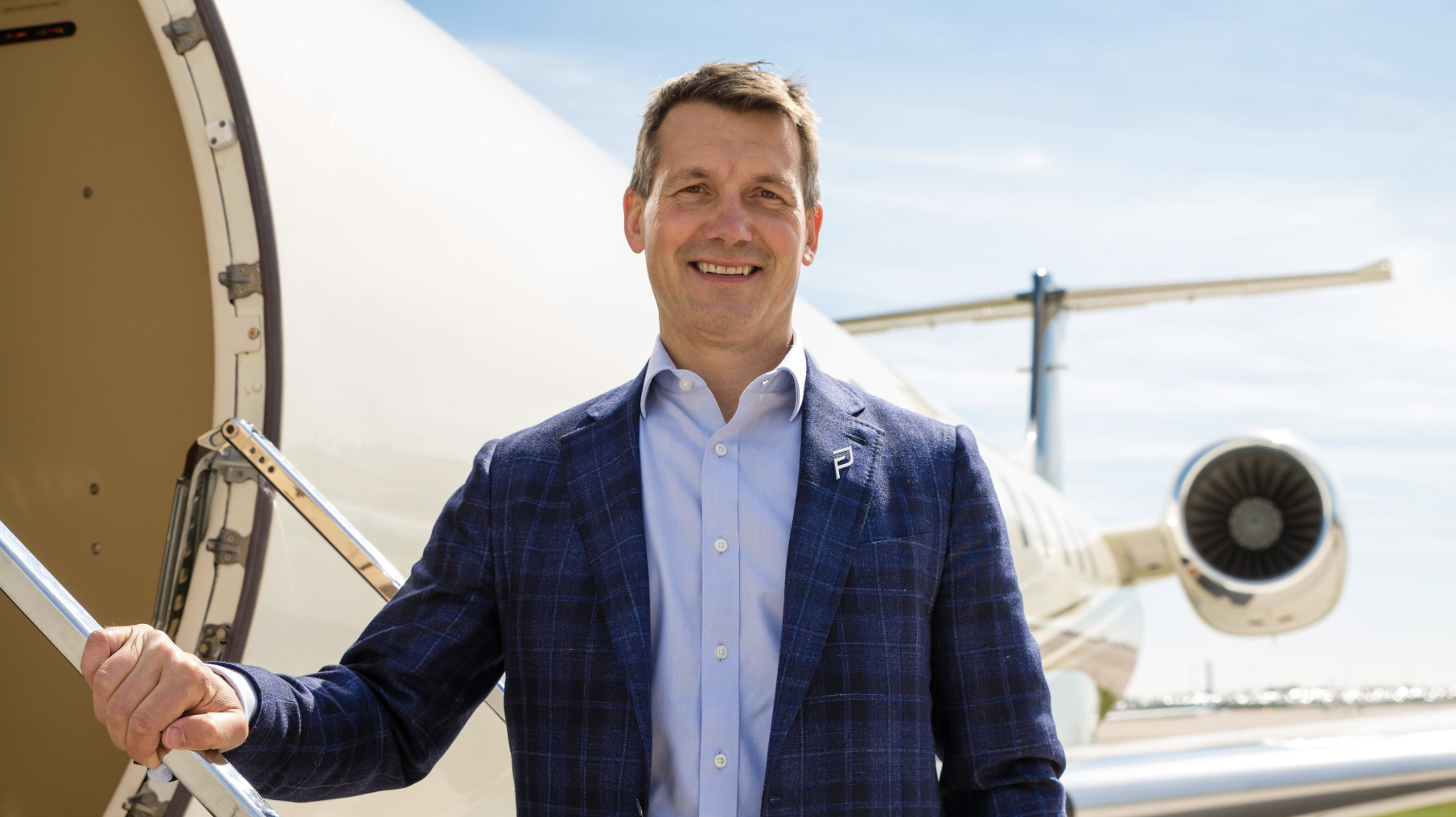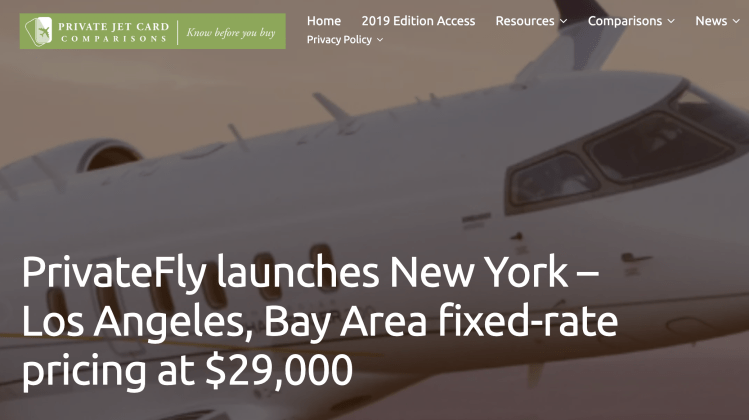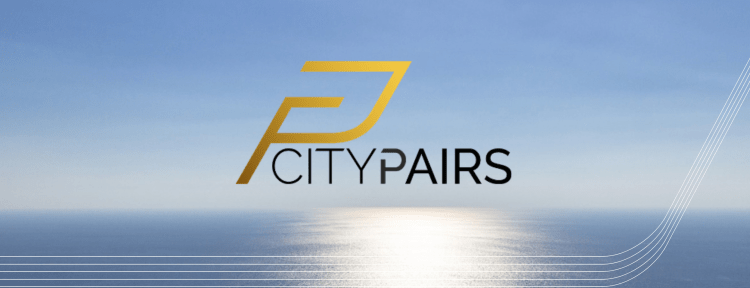

Last September Kenn Ricci’s Directional Aviation snapped up tech-driven U.K.-based private jet charter broker PrivateFly as it prepared for more expansion in Europe.
In the year since, Directional folded its own broker Skyjet into PrivateFly, launched fixed-rate pricing between key European cities, expanded it to select U.S. routes, and signaled its intention to grow here with the appointment of former NetJets and XOJET executive Gregg Slow as president of North America.
Private Jet Card Comparisons recently caught up with PrivateFly co-founder and CEO Adam Twidell during Revolution.aero in San Francisco where he talked about the deal, the year since, what’s ahead, and synergies with Directional’s OneSky siblings Flexjet and Sentient Jet. Below is a condensed and edited version of the interview.
Generally speaking, a first-time customer starts by flying privately with a friend or their company, then wants to fly and starts with the charter market because you fly trip by trip without commitment. Then for the customer who flies more regularly and wants fixed costs and guaranteed availability (on 10 hours notice), they will move into Sentient Jet. Then for the heavier user, there is Flexjet with Red Label, which is fractional ownership (and leases), so it’s comparable to owning your own aircraft with dedicated crews but none of the hassles.
We met Kenn and (Sentient Jet CEO) Andrew Collins three years before the acquisition happened. They came to London and they expressed their desire to bring some of their brands across to Europe, and they had two options, build it themselves or acquire it and do it faster. Europe is complex, all the different countries and customer profiles. We kept in touch with each other and when it was right for both parties it happened.
The first thing to say is everything that was promised in the run-up to the acquisition has been delivered and more. The classic example is a young entrepreneurial company being bought by a large corporation and it sucks the life out of the team changing the culture. Right from the top, Ken’s view was that the PrivateFly culture was terrific, and one of the biggest aims was not just to keep it, but to spread it.
We break down what we do into two words, people and technology. We offer customers both and they choose the portion of which they want. By having great technology we can deliver faster prices and find the perfect aircraft for the mission, but all the technology in the world isn’t great if the customer wants a personal experience. So the combination of the excellence of our team with the technology is our USP.
We were very transparent with the team all the way through the business. We issued share options to our staff so when the acquisition happened two-thirds of the team took home a nice amount of cash, which was great. (Co-founder and CMO) Carol (Cork) and I wanted everyone to share in the benefits of building a company together.
There isn’t anybody who values people more than Kenn. One of the defining moments for me, when I realized Directional Aviation was the company for Carol and me to sell to, was when Flexjet’s pilots voted to get the union out and deal directly with the company. Being a pilot myself, I know what a momentous decision that was, a vote of confidence unheard of in the U.S. that pilots would vote a union out.
One of the defining moments for me, when I realized Directional Aviation was the company for Carol and me to sell to, was when Flexjet’s pilots voted to get the union out and deal directly with the company
Adam Twidell, CEO, PrivateFly
Due diligence in an acquisition works both ways, and luckily as a pilot, you can bump into other pilots at an FBO and strike up a conversation, and what’s unique is the pilots at Flexjet all know Kenn personally. They all enjoy the time they spend with him. It’s evident with how they deal with passengers and even how they greet passengers. It feels very much a family-oriented group, and that’s exactly what PrivateFly feels like.
Skyjet was focused on the U.S., and while we had an office in Fort Lauderdale, our dominance was in Europe, so overnight we became a global player with access for our customers to great aircraft in both the States and Europe. We choose the PrivateFly brand based on brand recognition, especially the online presence.
Putting two companies together, no matter how like-minded the teams are, is a challenge. We were very transparent with a clear timetable. Communication is the key. We are around 75 in total and expanding. Recruitment is one of our biggest barriers to growth. We’ve never wanted to dilute the talent pool, and taking the right person takes time, so we would rather wait for the right person than fill a gap.
Training is very important. It takes time, and it’s a process that goes in stages. We invest heavily and we have a combination of very experienced and younger, energetic brokers so there is a lot of teamwork, and it takes time to train a broker.
We regularly bring in pilots to speak to the team to give our brokers an angle on the industry most don’t have. So even with something like weather, they have actual knowledge of what’s required. Many of our team quite happily describe themselves as aviation geeks, so they are passionate about our industry.
We don’t try to dictate how customers interact with us. The relationship with PrivateFly starts with the technology and the wider team, but if the customer hits it off with one individual, absolutely, we are happy to pair them up.
Some of our brokers get invited to family events. They become a trusted member of their inner circle. People are nervous about flying. They are protective of their family, and when they find somebody they can trust, there is a great amount of loyalty, and that’s important because largely in this sector you don’t have that type of loyalty. You get a lot of people shopping around.
Our demographic tends to be younger because of our technology, but we have a range of expertise. We have a team that focuses on the sports teams, we have another team focusing on entertainment so it’s a diverse customer base.
I’ve coined the phrase Brokerator. It really opens up new markets such as band tours and DJ tours in that we can dedicate an aircraft and a crew for a much longer time than the average broker. Of course, we compare it to the open market and give the client what’s best.
We have expanded well in Europe and there is plenty of growth left, however, growth in the U.S. is probably our biggest opportunity. We’re really pleased to have Gregg Slow join us to lead the team in the Americas. He brings experiences from NetJets and XOJET (where he set up its $100 million + off-fleet brokerage business). It’s been a very busy year (for new products), and all I’ll say at this point is next year will be very busy too.
At PrivateFly our core is on-demand, but we do allow customers to grow within that to have more certainty of pricing, and for those customers, we offer the Explorer membership with fixed pricing and guaranteed availability on a pay-as-you-go basis.
We also offer deposit accounts starting at $50,000, and those customers receive extra benefits, such as in the U.S. catering is included, premium FBOs, upgrade priority, and better cancelation terms. One of the clear advantages is how easy it is to book a jet. You don’t have to worry about payments. You have the money on account, so you book your flight and fly.
When you speak to on-demand customers the biggest question is why can’t you give me a (confirmed) price (right away) like the airlines. As a broker, we were limited by (third-party) operators and their technology as to how quickly they could price the trips.
However, with a fleet in the family, there is no need now to wait for an operator because essentially we are the operator. We know the volumes. We know the routes. So City Pairs is a fixed one-way price, so no ferry fees. It’s all-inclusive price, and while it does not guarantee availability, we have both our fleet and we can go to our preferred operators as well.
They are continuing and evolving for the winter, so you are going to be seeing more winter destinations. We are in the process of finalizing the prices, and the thinking is they will be additional to what we have.
We are continuing our $29,000 rate for our coast-to-coast flights, so no news at this point.
PrivateFly offers a very bespoke service in the U.S. and U.K. so I’m confident we can be price competitive on-demand for trans-Atlantic flight needs as well. We book a lot of that business already. I’ll end by saying, call us for a quote.
Find out why you should become a paid subscriber to Private Jet Card Comparisons here.

